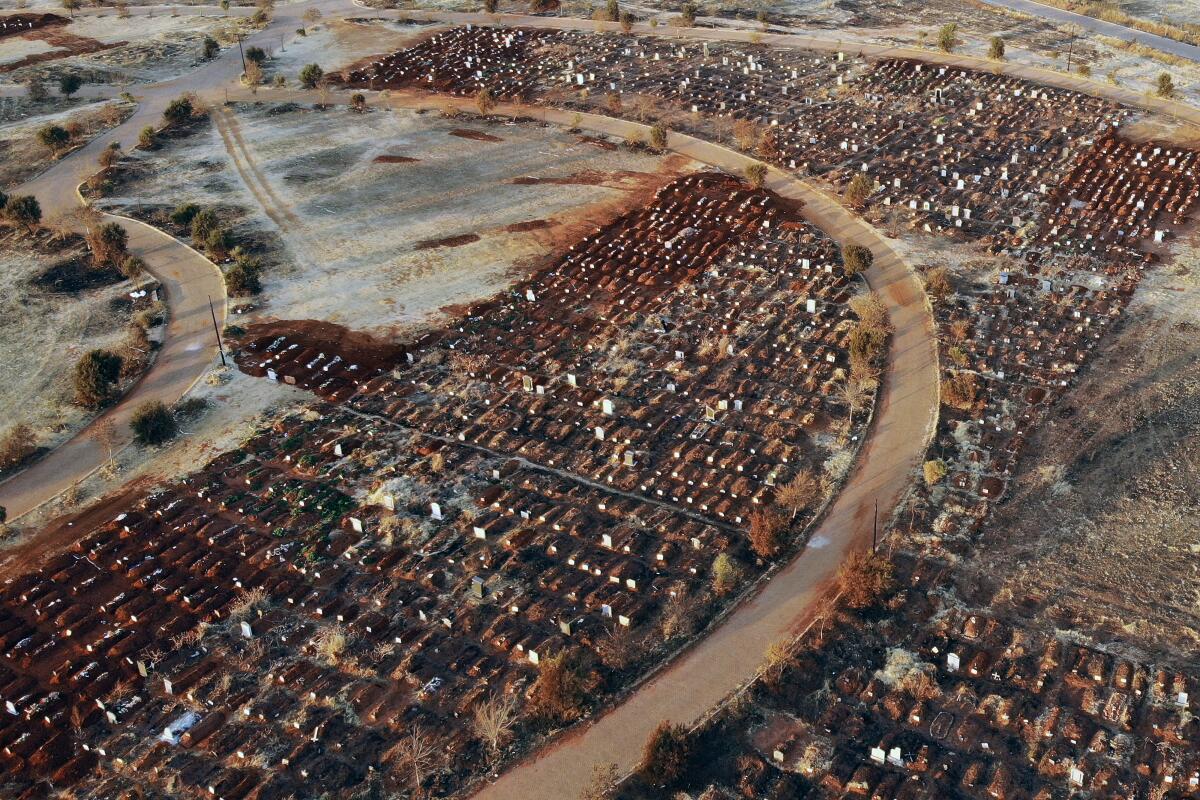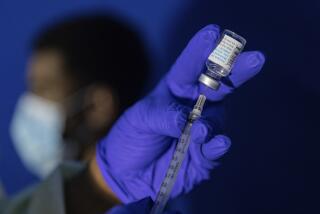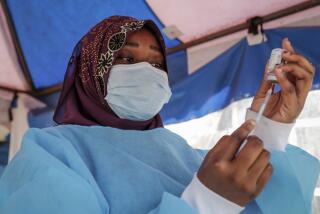Africa passes 1 million confirmed coronavirus cases. The true toll is probably much higher

- Share via
JOHANNESBURG — Africa’s confirmed coronavirus cases have surpassed 1 million, but global health experts say the true toll is likely several times higher, reflecting the gaping lack of testing for the continent’s 1.3 billion people.
While experts say infection tolls in richer nations can be significant undercounts, large numbers of undetected cases are a greater danger for Africa, with many of the world’s weakest health systems.
The World Health Organization calls the milestone a “pivotal point” for Africa as infections in several countries are surging. The virus has spread beyond major cities “into distant hinterlands” where few health resources exist and reaching care could take days.
Immediately knowing they were at a disadvantage, African nations banded together early in the pandemic to pursue badly needed testing and medical supplies and advocate for equitable access to any successful vaccine. Swift border closures delayed the virus’ spread.
But Africa’s most developed country, South Africa, has strained to cope as hospital beds fill up and confirmed cases are over half a million, ranking fifth in the world. The country has Africa’s most extensive testing and data collection, and yet a South African Medical Research Council report last week showed many COVID-19 deaths were going uncounted. Other deaths were attributed to other diseases as people avoid health centers and resources are diverted to the pandemic.
It’s all a warning for Africa’s other 53 countries of what might lie ahead. While dire early predictions for the pandemic have not played out, “we think it’s going to be here at a slow burn,” the WHO’s Africa chief, Matshidiso Moeti, said Thursday.
Just two African countries at the start of the pandemic were equipped to test for the virus. Now virtually all have basic capacity, but supplies are often scarce. Some countries have a single testing machine. Some conduct fewer than 500 tests per million people, while richer countries overseas conduct hundreds of thousands. Samples can take days to reach labs. Even in South Africa, turnaround times for many test results have been a week or longer.
“We are fighting this disease in the dark,” International Rescue Committee expert Stacey Mearns said. In addition, Africa has just 1,500 epidemiologists, a deficit of about 4,500.
African nations overall have conducted just 8.8 million tests since the pandemic began, well below the Africa Centers for Disease Control and Prevention’s goal of 13 million per month. Countries would love to increase testing if only supplies weren’t being snapped up by richer ones elsewhere.
Africa CDC Director John Nkengasong said estimating the true number of cases on the continent is “very tricky.” Some 70% of infections are asymptomatic, he has said. Africa’s young population also might be a factor. Without a dramatic increase in testing, “there’s much we don’t know.”
But some experts are making their best guesses.
Africa likely has at least 5 million infections, said Ridhwaan Suliman, a senior researcher at South Africa’s Council for Scientific and Industrial Research. He believes the true number in South Africa alone is at least 3 million. The country has conducted far more tests than any other in Africa — more than 3 million — but in recent days about 25% have come back positive. Because of shortages, South Africa largely limits testing to health workers and those showing symptoms.
Experts see South Africa as an indication of what’s to come elsewhere.
Sema Sgaier, an assistant professor of global health at Harvard University and director of the Surgo Foundation, thinks the number of infections across Africa could be more than 9 million. The U.S.-based Institute for Health Metrics and Evaluation puts the number at more than 8 million. And Resolve to Save Lives, led by Tom Frieden, former director of the U.S. Centers for Disease Control and Prevention, estimates it could be 14 million.
For Resolve to Save Lives Senior Vice President Amanda McClelland, the more worrying number is not the overall cases but the health workers infected across Africa — now about 35,000. That affects care for everyone on a continent whose shortage of workers has been called catastrophic.
Reflecting the pandemic’s diverse nature across Africa, just five countries account for 75% of confirmed cases: South Africa, Egypt, Nigeria, Ghana and Algeria. Nigeria alone could have had close to 1 million cases by now if Africa’s most populous country hadn’t acted quickly, the Africa CDC’s Nkengasong said.
Still, with insufficient testing, people live with the fear that loved ones may have had the virus without knowing for sure.
In Burkina Faso, Yaya Ouedraogo lost his uncle and cousin in April. Both were in their 70s with a history of high blood pressure and diabetes, and both had complained of shortness of breath, fever and body pain, he said.
“They had all the symptoms of coronavirus, but in certain areas no one was investigating it and they didn’t get tested,” he said.
The WHO Africa chief has said officials don’t think the continent is seeing a “silent huge epidemic,” with thousands dying undetected, but she acknowledged under-reporting of cases.
“What we’d like to see — to be able to be really confident — is higher testing rates,” Moeti told reporters last week, and she criticized the “very distorted global market” in which richer countries have the bulk of testing materials while poorer ones scrape by on just hundreds of tests a day.
Moeti also worries about a related danger for which even less data exist: the number of deaths from diseases such as malaria, HIV and tuberculosis as resources are diverted to COVID-19.
Whatever Africa’s real coronavirus toll, one South African church has quietly been marking the country’s “known” number of deaths by tying white ribbons to its fence. The project’s founders say each ribbon really stands for multiple people.
Already, the Rev. Gavin Lock wonders about what to do when the length of fence runs out. Maybe they’ll change the ribbons’ color to represent 10 people, or 50.
“It’s a work in progress,” he said.
More to Read
Sign up for Essential California
The most important California stories and recommendations in your inbox every morning.
You may occasionally receive promotional content from the Los Angeles Times.










